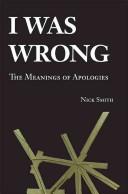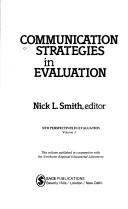| Listing 1 - 10 of 22 | << page >> |
Sort by
|

ISBN: 9780521684231 9780521865524 0521865522 0521684234 9780511499258 1107178738 1281370487 9786611370480 0511394098 0511391986 0511390785 0511499256 0511393296 9780511394744 0511394748 9780511394096 9780511391989 Year: 2008 Publisher: Cambridge ; New York : Cambridge University Press,
Abstract | Keywords | Export | Availability | Bookmark
 Loading...
Loading...Choose an application
- Reference Manager
- EndNote
- RefWorks (Direct export to RefWorks)
Apologies can be profoundly meaningful, yet many gestures of contrition - especially those in legal contexts - appear hollow and even deceptive. Discussing numerous examples from ancient and recent history, I Was Wrong argues that we suffer from considerable confusion about the moral meanings and social functions of these complex interactions. Rather than asking whether a speech act 'is or is not' an apology, Smith offers a highly nuanced theory of apologetic meaning. Smith leads us though a series of rich philosophical and interdisciplinary questions, explaining how apologies have evolved from a confluence of diverse cultural and religious practices that do not translate easily into secular discourse or gender stereotypes. After classifying several varieties of apologies between individuals, Smith turns to apologies from collectives. Although apologies from corporations, governments, and other groups can be quite meaningful in certain respects, we should be suspicious of those that supplant apologies from individual wrongdoers.
Apologizing. --- Ethics. --- Deontology --- Ethics, Primitive --- Ethology --- Moral philosophy --- Morality --- Morals --- Philosophy, Moral --- Science, Moral --- Philosophy --- Values --- Apology (Psychology) --- Social interaction --- Arts and Humanities
Book
ISBN: 1139698575 1139861573 0511843968 1107007542 0521189454 Year: 2014 Publisher: Cambridge : Cambridge University Press,
Abstract | Keywords | Export | Availability | Bookmark
 Loading...
Loading...Choose an application
- Reference Manager
- EndNote
- RefWorks (Direct export to RefWorks)
In this follow up to I Was Wrong: The Meanings of Apologies, Nick Smith expands his ambitious theories of categorical apologies to civil and criminal law. After rejecting court-ordered apologies as unjustifiable humiliation, this book explains that penitentiaries were originally designed to bring about penance - something like apology - and that this tradition has been lost in the assembly line of mass incarceration. Smith argues that the state should modernize these principles and techniques to reduce punishments for offenders who demonstrate moral transformation through apologizing. Smith also explains the counterintuitive situation whereby apologies come to have considerable financial worth in civil cases because victims associate them with priceless matters of the soul. Such confusions allow powerful wrongdoers to manipulate perceptions to disastrous effect, such as when corporations or governments assert that apologies do not equate to accepting blame or require reform or redress.
Law --- Apologizing. --- Remorse. --- Punishment. --- Penalties (Criminal law) --- Penology --- Corrections --- Impunity --- Retribution --- Jurisprudence --- Juridical psychology --- Juristic psychology --- Legal psychology --- Psychology, Juridical --- Psychology, Juristic --- Psychology, Legal --- Psychology, Applied --- Therapeutic jurisprudence --- Remorsefulness --- Reproach of self --- Self-reproach --- Emotions --- Apology (Psychology) --- Social interaction --- Psychological aspects. --- Philosophy. --- Psychology
Book
Year: 2009 Publisher: Dordrecht: Springer,
Abstract | Keywords | Export | Availability | Bookmark
 Loading...
Loading...Choose an application
- Reference Manager
- EndNote
- RefWorks (Direct export to RefWorks)
Book
ISBN: 0803916124 9780803916128 Year: 1981 Volume: 2 Publisher: Beverly Hills (Calif.) : Sage,
Abstract | Keywords | Export | Availability | Bookmark
 Loading...
Loading...Choose an application
- Reference Manager
- EndNote
- RefWorks (Direct export to RefWorks)
Evaluation --- Assessment --- Research --- Evaluation.
Book
ISBN: 0335247148 1299779301 0335247156 9780335247158 9780335247141 Year: 2013 Publisher: Maidenhead, Berkshire, England : McGraw-Hill Education, Open University Press,
Abstract | Keywords | Export | Availability | Bookmark
 Loading...
Loading...Choose an application
- Reference Manager
- EndNote
- RefWorks (Direct export to RefWorks)
Covering the essential key skills and personal development of the successful coach, mentor or supervisor, with guidelines for practice.
Employee motivation. --- Employees -- Coaching of. --- Mentoring in business. --- Success in business. --- Social Sciences --- Psychology --- Mentoring. --- Mentorship --- Counseling --- Executive coaching --- Mentoring in business --- Supervision --- Business consultants --- E-books --- Efficiency engineers --- Management advisory services --- Management consultants --- Consultants --- Business analysts --- Interim executives --- Supervisory relationships --- Management --- Mentors in business --- Business --- Employees --- Business coaching --- Coaching, Executive --- Corporate coaching --- Leadership coaching --- Management coaching --- Coaching of --- Executive coaching. --- Business consultants. --- Supervision.
Book
ISBN: 9781555427412 1555427413 Year: 1992 Publisher: San Francisco [CA.]: Jossey-Bass,
Abstract | Keywords | Export | Availability | Bookmark
 Loading...
Loading...Choose an application
- Reference Manager
- EndNote
- RefWorks (Direct export to RefWorks)
Book
ISBN: 1452965439 1452965447 1517910927 Year: 2021 Publisher: University of Minnesota Press
Abstract | Keywords | Export | Availability | Bookmark
 Loading...
Loading...Choose an application
- Reference Manager
- EndNote
- RefWorks (Direct export to RefWorks)
Book
ISBN: 9781446249680 9781446249697 Year: 2014 Publisher: Los Angeles, Calif. Sage
Abstract | Keywords | Export | Availability | Bookmark
 Loading...
Loading...Choose an application
- Reference Manager
- EndNote
- RefWorks (Direct export to RefWorks)
Study methods --- Higher education --- Environmental planning --- urban planning --- rural planning --- studiemethoden

ISBN: 0803918216 Year: 1982 Volume: 3 Publisher: Beverly Hills : Sage Publications,
Abstract | Keywords | Export | Availability | Bookmark
 Loading...
Loading...Choose an application
- Reference Manager
- EndNote
- RefWorks (Direct export to RefWorks)
Communication --- Evaluation --- Methodology --- Méthodologie
Book
ISBN: 9781517910921 9781517910914 Year: 2021 Publisher: Minneapolis University of Minnesota Press
Abstract | Keywords | Export | Availability | Bookmark
 Loading...
Loading...Choose an application
- Reference Manager
- EndNote
- RefWorks (Direct export to RefWorks)
"How China's expansive new era of urbanization threatens to undermine the foundations of rural life. Centered on the mountainous region of Chongqing, which serves as an experimental site for the country's new urban development policies, The End of the Village analyzes the radical expansion of urbanization and its consequences for China's villagers. Offering an unprecedented look at the country's contentious shift in urban planning and policy, Nick R. Smith exposes the precarious future of rural life in China and suggests a critical reappraisal of how we think about urbanization."--
Urbanization --- Rural development --- Rural-urban relations --- Urban policy --- China --- Rural conditions.
| Listing 1 - 10 of 22 | << page >> |
Sort by
|

 Search
Search Feedback
Feedback About UniCat
About UniCat  Help
Help News
News